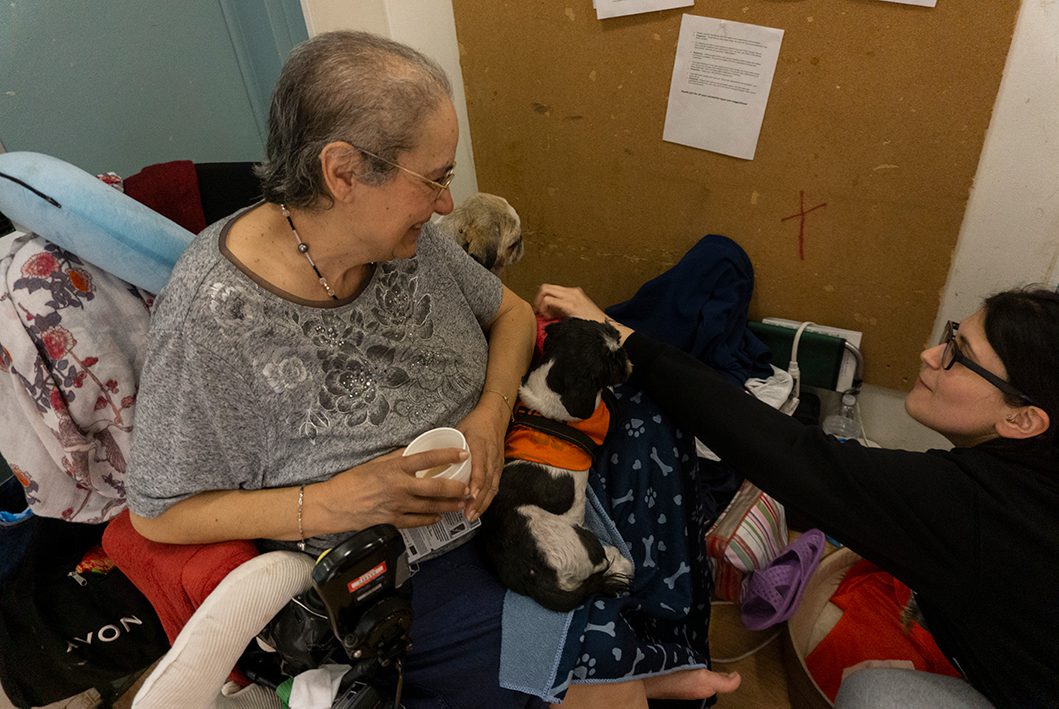At 4 a.m., the lights are dim as soft snores and whispers travel the floor of Sistering’s 24-hour drop-in centre.
The drop-in is located on Bloor Street West and Dovercourt Road and sleeps between 30 to 50 women on any given night. Numbers increase during the warmer months when emergency beds from the winter are removed from shelters.
Toni Corrado, 71, and her two lap dogs, Booboo and Harry Potter, snuggle in their favourite corner. It’s large enough to fit her wheelchair. Around them are 30 women, sleeping on floor mats, plastic chairs, and leaning against tables that will be used to serve breakfast in a few hours.
(Story continues below)

“I didn’t have the strength to fight and I got evicted.”
-Toni Corrado
Corrado has been in a wheelchair since 1990 following a workplace accident. She was a flight attendant at the time when she fell off a high platform as passengers boarded a plane, she says. Corrado suffered brain damage and spinal stenosis, a pinching of the nerves that causes chronic pain.
In the past few years, Corrado became depressed after the loss of her mother to dementia and Parkinson’s. Eventually, she was unable to care for herself or manage her finances.
“I didn’t have the strength to fight and I got evicted,” says Corrado.
Before spending nights at Sistering’s 24-hour centre, she stayed in a Fred Victor shelter in North York, one of the few that are pet friendly.
“I was put in a room with women that were doing crack cocaine (and) crystal meth,” says Corrado. “(They) went into terrible, awful rages and fights (and) terrorized me and my dogs.”
She thinks the organizations that serve homeless populations in Toronto aren’t equipped to deal with accessibility needs. She notes that the only accessible washroom at Fred Victor was used by everyone. Once, a client used the washroom for a three-hour shower, she says.
“I was the one that mostly couldn’t use it,” she says.
Inta Dukule, marketing manager at Fred Victor, says she was sad to hear about Corrado’s experience, noting it is not their practice. “Our staff do everything to ensure the safety of clients,” Dukule said. “We take every measure to minimize substance use on our premises, while maintaining a harm reduction approach to our services.”
Dukule says the agency works around the clock to get people a safe bed for the night, whether it be at Fred Victor or through a referral elsewhere.
Fred Victor offers housing and shelter support to men, women and families. They connect community members to healthcare services, including mental health and addiction support.
“People reach out at all hours of the night on our Facebook page so I am always monitoring it,” she says. Last year, they made 25,000 health and community service connections — ranging from booking doctors appointments to prescriptions to emergency care. Another 1,000 clients accessed their employment and training services.
According to Fred Victor’s data, over 9,200 people are homeless in Toronto, with a 98 per cent occupancy rate in shelters.
The City of Toronto’s 2018 data on why people are homeless points to the rising cost of rent over the past 10 years. The average market rent for a one-bedroom unit has increased by 26 per cent, while government-subsidized income like Ontario Works or the Shelter Benefit have increased by eight per cent.
“People just can’t afford to live here,” says Dukule. “Their income simply doesn’t come close to paying these prices, and no one is addressing people’s mental health (which) makes it even harder to get housed.”
Check out more Toronto at 4 a.m. content here!
Instagram: @6ix_at_4
Twitter: @6ix_at_4
Facebook: Torontoat4am

